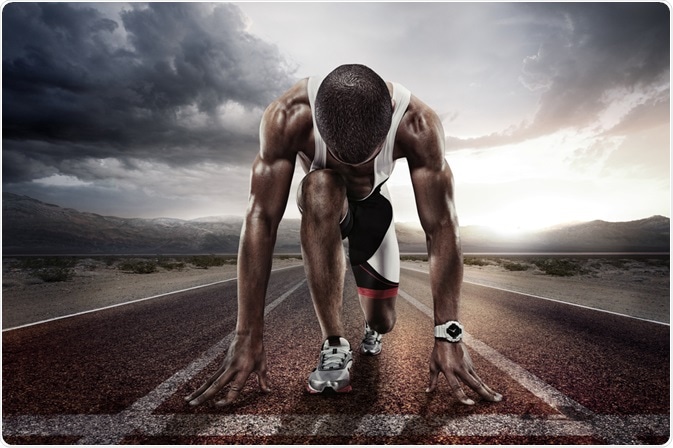Athletes generally lookout for diets that lower body fat percentage, increase lean body mass and help increase exercise capacity.

Image Credit: Rocksweeper/Shutterstock.com
Traditionally, the non-vegetarian diet was seen as an irreplaceable way of enhancing performance; however, recent times have witnessed a growing trend towards plant-based diets.
What is a vegan diet?
People following a vegetarian diet may be either ovo-lacto vegetarian or lacto-vegetarians or vegans.
An ovo-lacto vegetarian is a vegetarian who consumes eggs and dairy products but excludes meat and fish. On the other hand, Lacto-vegetarians consume dairy products but exclude meat, poultry, fish, and eggs. A vegan diet is a plant-based diet that excludes all animal products, including dairy products and eggs.
Challenges for athletes who follow a vegan diet
Athletes who want to adopt a vegan diet must ensure that they plan a diet comprised of nutrient-dense foods with adequate amounts of protein, fats, and essential nutrients.
Athletes on a vegan diet may face the following challenges:
- Less proportion of calories
Due to the increased intensity of physical activity, athletes have increased calorie needs. Compared to a non-vegetarian diet, a vegan diet contains less proportion of calories and hence may pose a serious problem.
- Lack of essential nutrients
Essential nutrients include substances that the body can't synthesize in sufficient quantity on its own, and hence have to be taken in the form of food. Essential nutrients are vital for preventing disease and promoting growth and health; they are important to support healthy muscle growth, manage bone density and enable oxygen transport.
The vegan diet lacks some crucial essential nutrients like iron, zinc, vitamin B12, calcium, vitamin D and omega-3 fatty acids. These essential nutrients are mainly found in animal products.
- Restricted to plant-based protein sources
Proteins are the building blocks of the body and are required for muscle repair, immune function, and bone health. Animal sources are rich in proteins and comprise all of the essential amino acids, which our body cannot synthesize. On the other hand, the vegan diet has limited food options that provide complete proteins (e.g. quinoa and soya). Another challenge is that absorption of protein in the body is hampered due to the higher fiber content of plant-based food.
How effective is the vegan diet?
Though many athletes have turned to veganism; the influence of a vegan diet on exercise capacity is yet to be clarified and represents a topic of debate. The bottom line would be to make healthy choices with whatever diet followed.
A study published in the Journal of the International Society of Sports Nutrition showed that “There are no differences in exercise capacity between vegan, lacto-ovo-vegetarians and omnivorous recreational runners”. Athletes had similar levels of exercise performance regardless of whether or not their diets contained animal products.
Vegetarian diets are characterized by increased intake of carbohydrates and plant-based antioxidants, this is believed to have favorable effects on exercise capacity in athletes. However, vegans have lower iron levels as evident from the low hemoglobin levels and the occurrence of iron deficiency anemia. Also, vegans who have inadequate intake of protein, creatine, and carnitine, may harm their performance.
Healthy food options for a vegan diet
Here is a list of some food alternatives which vegans can include in their daily diet.
Plant-based sources rich in protein - Beans, quinoa, hemp seeds, chia seeds, lentils, nuts, and soy products are some well-known examples of plant-based sources rich in protein.
Plant-based sources rich in iron – Iron-rich plant sources include tofu, chickpeas, cashew nuts, raisins kale, spinach, fortified cereals, and quinoa. It is suggested to consume this iron-rich food with foods high in vitamin C such as tomatoes, oranges, lemon, and other citrus fruits to improve iron absorption. The consumption of iron-rich foods at the same time as tea, coffee, and calcium-containing foods should be avoided, as they can reduce iron absorption.
Plant-based sources rich in calcium and vitamin D – Good plant sources of calcium include soy milk, almond milk, tofu, and blackstrap molasses, and broccoli. Some plant-based food sources rich in vitamin D include fortified foods, cereals, mushrooms, and orange juice.
Plant-based sources rich in vitamin B 12 – Vitamin B12 is the only vitamin that is not naturally available in adequate amounts from a plant-based diet. Foods fortified with B12 such as plant milk, breakfast cereals, soy milk, and nutritional yeast are some options that vegans can try. Some vegans choose to take a B12 supplement to ensure that they meet this nutritional need.
Omega-3 fatty acid sources
Chia seeds, walnuts, flaxseed, brussels sprouts, canola oil are some plant-based food sources rich in omega-3 fatty acid.
Sources
Yes, You Can Be a Vegetarian and an Athlete, Too. Cleveland Clinic. https://health.clevelandclinic.org/yes-can-vegetarian-athlete/.
Nebl, J, (2019). Exercise capacity of vegan, lacto-ovo-vegetarian and omnivorous recreational runners. Journal of the International Society of Sports Nutrition, 16(1), 23. DOI:10.1186/s12970-019-0289-4
Further Reading
Last Updated: Jan 23, 2020